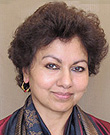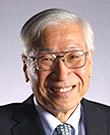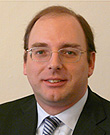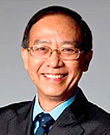|
| Title: Advancing research and practice in ODL: Where are the missing links? |
Date: 28 October 2014 (Tuesday) Time: 15:30 – 16:30 Time: 15:30 – 16:30 |

Prof. Asha Kanwar
President and CEO
Commonwealth of Learning
|
Keynote address
Open and distance learning (ODL) has emerged as a major force in the education sector during the last five decades, with a large number of universities initiating courses attracting millions of students. However, ODL institutions have focused on education and have remained passive towards two other important roles of universities: research and outreach. Research needs to be perceived from two angles: as strengthening education and as strengthening outreach. The advancement of ICTs, MOOCs and OERs makes research and sharing necessary because without research and sharing these developments cannot be domesticated and appropriated to suit a developing country’s needs. The ability of ODL to influence development outcomes and impact is being constantly questioned, and the dearth of research in this area has aggravated the situation. ODL institutions need to develop appropriate policies and organizational frameworks to promote research and sharing practices which can help to strengthen the position of ODL as an effective tool for achieving educational outcomes.
--------------
Prof. Asha Kanwar became President and Chief Executive Officer of the Commonwealth of Learning (COL) on 1 June 2012. She has served COL for nine years, first as an Education Specialist – Higher Education and Policy and then as its Vice President for six years.
Before joining COL, Prof. Kanwar was a consultant in open and distance learning at UNESCO’s Regional Office for Education in Africa (BREDA) in Dakar, Senegal. She has over 30 years of experience in teaching, research and administration. |
|
| Title: After MOOCs |
Date: 29 October 2014 (Wednesday) Time: 9:00 – 10:00 Time: 9:00 – 10:00 |

Prof. Yoichi Okabe
President
Open University of Japan |
Keynote address
A wave of MOOCs in the US has encouraged organizations in other countries to offer similar courses. In Japan, an organization called JMOOC (Japan Open Online Education Promotion Council) was established in October 2013 and started to offer several courses, including three courses from the Open University of Japan (OUJ). JMOOC is expecting to offer 100 courses by April 2015.
However, it seems that little additional news on MOOCs in the US has been reported recently. It appears that the number of MOOCs is still increasing but that the market will be gradually saturated. Probably the biggest effect of MOOCs has been to make a number of stakeholders aware of e-learning and online education.
The term ‘MOOCs’ contains two major concepts. The first concept is ‘massive,’ which was easily achieved through the Internet and open SNS-like discussion systems. The second concept is ‘open,’ which refers not only to contents being open but also to all learning procedures being completely open and accessible to anybody. A result of openness is that no fees are collected from learners. Neither money for producing courses nor for maintaining them is easily obtainable in the current MOOC business model. Governments or universities support MOOCs only when MOOCs bring tangible benefits to a nation or a university. Ambitious professors alone cannot sustain MOOCs.
Now is a good time to reconsider the role of MOOCs in higher education and their next phase. OUJ owns and operates one TV channel and one radio channel. The 350 courses currently broadcasted over the air can also be accessed online by registered students. However, we still lag behind higher education institutions in other countries in offering interactive online courses. JMOOC has given us a good opportunity to explore a new direction in interactive learning. Such exploration is very useful as it allows us to experiment with what works and what does not. For example, we have come to think that some types of interaction different from those in Western countries will be necessary for Asian students. In any event, the next phase of MOOCs will be platforms that support better teaching and learning practices.
--------------
Prof. Yoichi Okabe is the President of the Open University of Japan (OUJ). After graduating from the department of Electrical and Electronic Engineering of the University of Tokyo, he joined the university as a faculty member in 1972. He was assigned to various academic and administrative roles, becoming the Director of the Research Center for Advanced Science and Technology in 1999 and then the Director of Information Technology in 2001.
After retiring from the University of Tokyo in 2006, he joined OUJ, where he has been in charge of promoting information and communication technology (ICT) infrastructure, particularly in the area of education.
Prof. Okabe became a Vice-President of OUJ in 2007 and the President in 2011. |
|
| Title: Opening up universities: A strategy-driven radical innovation process at the Portuguese Open University |
Date: 29 October 2014 (Wednesday) Time: 14:00 – 15:00 Time: 14:00 – 15:00 |

Prof. António Teixeira
President
European Distance and E-learning Network
Professor of Distance Education
Universidade Aberta |
Keynote address
Throughout history, universities have contributed substantially to revolutionizing society. However, they have always demonstrated great unease and had difficulty when addressing their own need for change. Universities are traditionally conservative institutions. As a result, university change has mostly resulted from external input and has seldom been propelled by internal driving forces.
However, societal challenges and social demand resulting from the radical impact of technological innovation today in our world calls for continuous and ever more radical and rapid institutional adaptation and change. University management needs to be more responsive to external challenges and more capable of responding speedily, readjusting the organizational models at an increasingly faster pace. This implies the dissemination of an open educational culture across the university sector, as has been demonstrated by recent policies of the European Commission.
In spite of their more flexible mode of organization and operation, open universities also face this difficulty of implementing institutional radical change. In my keynote, I address this issue by analysing the process and results of the transformation undertaken by Universidade Aberta, the Portuguese Open University, in the period 2006–2009. An integrated strategic innovation programme successfully and speedily managed to transform the university from a print-based distance learning institution into a fully online one. I will focus the analysis on the critical importance attributed to organizational culture innovation, the transparency of the process and the extensive involvement of the university community in its collaborative implementation. I will also show how this process contributed in a decisive way to the dissemination of e-learning within the Portuguese higher education system and also led to the globalization of Universidade Aberta, allowing the institution to expand into new international markets.
--------------
Prof. António Teixeira is the President of EDEN (European Distance and E-learning Network) and a Director at Ibstpi (International Board of Standards for Training, Performance and Instruction). He has also been a Professor at the Universidade Aberta, the Portuguese Open University (Department of Education and Distance Learning) since 1991, and is a researcher at the University of Lisbon.
He received his training in Philosophy at the University of Lisbon (MPhil 1994, PhD 2003) and in online education at the University of Turku (2004). From 2006 to 2009, he was Pro-rector for Innovation in Distance Learning at Universidade Aberta. In that capacity, he conceived the strategy for and managed the university’s successful and speedy transition from a print-based distance learning institution to a fully online one. He was also responsible for the design and initial implementation of the university’s research lab on distance education (LEaD) and the university’s open access scientific repository (Repositório Aberto).
From 2007 to 2009, he was member of the Academic and Administration boards of Asia’s International Open University (UAIA) and of the Portuguese Rectors Council (CRUP) specialized committees on Scientific Research and Knowledge Transfer, and Evaluation, Quality and Innovation. Presently he is a member of the International Advisory Board of the Distance Education and Learning Futures Alliance of Massey University (New Zealand). He is also the Vice-president of the Ad Lucem Association (University of Lisbon) and is on the scientific board of a number of international journals in education.
Over the years he has participated in close to twenty international research projects funded by the European Commission or the William and Flora Hewlett Foundation and has been a member of several task forces on open educational resources, lifelong learning, virtual mobility and sustainable development. He has also been a member of the e-ASEM network (Asia-Europe Meeting) since 2008 and of the Expert’s Board of the Horizon Report for Iberoamerica (in 2010, 2012 and 2013).
He has given over 100 presentations at international conferences and published over 60 scientific articles and other publications. He was a visiting scholar at the Korean National Open University in 2010 and received an EDEN Fellowship for demonstrating excellence in the professional practice of open, distance and e-learning. Other awards received:
- Learning Impact Leadership Award 2011 (IMS Global Learning Consortium)
- Award for Leading Practice in Learning Impact (EDEN 2010 Annual Conference)
- Award for Leading Innovative Practice (EDEN 7th Open Classroom Conference, 2009).
|
|
| Title: The changing landscape confronting open-access universities: Musings from Singapore |
Date: 30 October 2014 (Thursday) Time: 9:00 – 10:00 Time: 9:00 – 10:00 |

Prof. Cheong Hee Kiat
President
SIM University |
Keynote address
Much has been said about the ‘massification’ of higher education and the challenges of providing good-quality university education to the masses. Online- and distance-learning universities are responding valiantly to this demand. However, lately we have witnessed the problems of the ‘overproduction’ of graduates in various countries and a mismatch between the number of graduates and the supply of jobs appropriate for them. More ominous is the mismatch between what graduates are trained in and what jobs require for immediate employment and long-term career advancement. Advanced economies are now emphasizing skills acquisition rather than academic accomplishment or qualifications, and continuous training rather than a dichotomy between education and work. Additionally, the cost of running a good university, even an online one or one with ‘blended learning,’ is becoming increasingly prohibitive, and this can further disenfranchise students or cripple some universities. How should open-access universities react to these developments? Discussion in this presentation is centred on the example of Singapore, which has been reviewing its higher education provision in the light of anticipated developments in higher education and graduate employment with a desire to enable every citizen to reach his/her full potential through different learning and upgrading pathways and opportunities.
--------------
Prof. Cheong Hee Kiat is the founding President of SIM University (UniSIM), Singapore. He was Deputy President and Dean of the School of Civil and Environmental Engineering of Nanyang Technological University, Singapore, before joining UniSIM in 2005. In academia since 1986, his experience covers teaching, research, international relations, leadership roles in undergraduate and graduate studies, continuing education, campus development and e-learning.
Prof. Cheong has served on the boards of various institutions of higher learning and statutory bodies. He has also participated in a number of international academic audits and accreditation exercises. He currently chairs the Polytechnic Quality Assurance Framework External Review Panel and is a member of the Engineering Accreditation Board of the Institution of Engineers, Singapore.
Prof. Cheong has been a member of government committees on various higher education studies, including on the setting up of the fourth publicly funded university and the third law school, the increase of publicly funded university places, and the enhancement of applied education in polytechnics and the Institute of Technical Education. He also serves the Singapore University of Technology and Design as a member of its Executive Committee. He is a board member of the Singapore Bible College and a Director of Grace Baptist Church.
A civil engineer by training (BEng (Hons Cl 1), Adelaide), Prof. Cheong went on to obtain his MSc, DIC and PhD from the Imperial College, London. He is a registered Professional Engineer, and a Fellow of the Institution of Engineers, Singapore and of the Academy of Engineering, Singapore.
|
|
|







